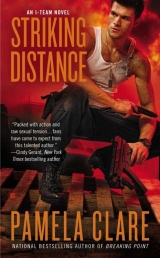
Текст книги "Striking Distance"
Автор книги: Pamela Clare
сообщить о нарушении
Текущая страница: 2 (всего у книги 23 страниц)
Al-Nassar began to struggle, trying to pull his head away, blood trickling from his nose and a cut on his cheek.
Zimmerman stood and restrained him none too gently while Wilson tied a tourniquet over the bastard’s eyes. “You need to shut the fuck up and leave her alone, asshole. Got that? Yeah, I know you understood me. Went to Oxford, didn’t you? Paid the Brits back for your first-class education by trying to blow them up.”
Shaking with unspent anger, Javier looked down at Laura again. She probably thought they’d come to rescue her, when the truth was they hadn’t even known she was there. If she hadn’t shouted out for him, if she hadn’t run . . .
Christ!
He didn’t want to think about that.
What counted was that she
had
run. She’d found the strength and the guts to break free, to shout out, to let them know she was there.
And now they were taking her home.
CHAPTER
1
February 14, 2013
Manhattan, New York
SANDWICHED BETWEEN THE two deputy U.S. Marshals—or DUSMs—who’d been assigned to escort her, Laura Nilsson pushed her way through the throng of reporters gathered outside the federal courthouse in Lower Manhattan, clutching her gray double-breasted wool coat tightly around her, a chill inside her that had nothing to do with the icy wind. Reporters pressed up against the barricades, called out questions, their mics shoved in her face, cameras clicking around her.
“How will it feel to face Al-Nassar in a court of law?”
“Why did you choose to testify? Are you hoping to encourage other victims of sexual violence to speak out?”
“What message do you hope to give the jury today?”
Laura stopped at the top of the stairs, turned to face the reporters, and willed herself to smile, refusing to let the cameras see inside her.
You can do this.
Pausing to gather her scattered thoughts, she spoke the words she’d rehearsed. “Thank you all for your support. Today marks for me the final chapter of an ordeal that began three and a half years ago. I know that justice will be served not only on my behalf, but also on behalf of the hundreds of others around the world who have suffered as a result of Al-Nassar’s terrible actions.”
Having given them a quote to take back to their editors, she turned to enter the courthouse. But she hadn’t taken a single step when another question rang out.
“What is your response to the allegations from Derek Tower of Tower Global Security that negligence on your part led to your abduction and the deaths of your cameraman, your security detail, and the safe house director?”
Her step faltered.
She fought back a rush of rage, turned toward the voice, and met the reporter’s gaze, her lips twisting into her best imitation of a smile. “Slow news day?”
The insult made the other reporters snicker.
Laura looked into the cameras once more, fighting to maintain her façade of calm. “The State Department’s investigation into my abduction was closed even before I was found alive. It was a random, tragic event perpetrated by a depraved terrorist. No one regrets what happened that day more than I do.”
“Not even the families of the men who died trying to protect you?”
She ignored the taunt, turned her back on the crowd, and entered the courthouse, disregarding the shouted questions that chased after her. The trial was closed to cameras and all but a handful of reporters, who’d been selected at random from a pool of news organizations, the solemn quiet inside the lobby a stark contrast to the chaos outside.
But Tower’s attack, so unexpected, had Laura’s heart thrumming. The bastard didn’t know when to quit. He’d been harassing her for weeks, insisting that it was
her
fault she’d been abducted. What did he think he was doing feeding those allegations to a reporter, making them public? Did he really think that dragging her down could somehow make his company look better?
Forget him. It’s not important.
She didn’t have time to think about that now. Not now. Not today.
A uniformed DUSM motioned her forward. “Put your purse in the plastic bin. Empty your pockets of keys, change, or other metal objects, and pass through the metal detector.”
She moved quickly through the security checkpoint, relieved to find Marie Santelle, one of the assistants with the U.S. Attorney’s Office, waiting for her. Dressed in a tailored black pantsuit, her dark hair done up in a sleek bun, Marie smiled, took Laura’s hand, and gave it a reassuring squeeze. “How are you holding up?”
“I’m fine.” What else could she say? That she hadn’t slept last night? That her stomach was tied in knots? That she felt terrified?
Today, two years and three days after the SEALs rescued her from a living hell, she would see Al-Nassar again. She would face him in a courtroom, look him in the eyes, and denounce him to the world.
It was the day she’d been waiting for. It was the day she’d been dreading.
It was nearing the end of the second week of his trial, and his face had been all over the news, together with hers. It made no sense to Laura. The crimes he’d committed against her were the least of his offenses, nothing but a footnote in a criminal history that included terrorism and mass murder. And yet the press was obsessed with what he had done to
her
. Reporters had staked her out, called her at work, asked her questions that went beyond the public’s right to know, hoping to titillate their audiences with her worst memories, the ordeal she’d been fighting to put behind her fodder for public discussion on every channel, in every newspaper, on talk radio.
Allt kommer att bli bättre med tiden.
Everything will get better with time.
Her grandmother’s reassuring words came back to her.
Yes, it would all get better with time. It was already better.
Laura was no longer the terrorized, shattered woman the SEALs had rescued, a woman who barely remembered her own name. A year and a half of living with her mother and grandmother in Stockholm, together with intensive daily therapy, had helped her begin to heal. She might not feel like her old self, but she was slowly defining her
new
self. Or so her therapist had said when she’d burst into tears of frustration one afternoon, angry at herself for still being so pathetically weak, so fearful, so broken.
Her time as a captive made up only eighteen months out of thirty-two
years
of her life, and yet it seemed to define her. There were still days when the pain inside her was so strong she feared that if she started to cry, she would never be able to stop.
Still, she had so many reasons to be grateful.
She’d regained all the weight she’d lost and was no longer anemic. She was sleeping at night—most of the time. She was back in the States and had a nice loft in lower downtown Denver, or LoDo as locals called it. She had a seat on the I-Team—the award-winning Investigative Team at the
Denver Independent
newspaper. She’d even been on a few dates, though nothing had come of them.
It was a new beginning even if it wasn’t the life she’d planned for herself. And yet no matter how good her life was now, she didn’t feel whole.
One precious, important piece was still missing.
“Sorry about the mob outside.” Marie gave her hand another squeeze, then turned with the two deputies toward the elevators.
The media were the least of Laura’s worries today. “They’re just doing their job.”
She waited in silence with the others for the elevator car to arrive. When the doors closed, Marie spoke again.
“I’m taking you to a private witness room where you’ll stay until it’s time for you to testify. We’ll view the live footage of your abduction first. You’re still certain you don’t want to see that?”
Laura nodded. “I’m certain.”
She didn’t want to watch her friends die all over again or hear her own screams. Besides, she didn’t need to see it. That moment lived in her nightmares.
“I understand.” Marie’s brown eyes held no judgment, only sympathy. “When that’s done, we’ll bring you in.”
As Marie went over Laura’s testimony, Laura began to feel queasy. By the time they’d reached the private witness room, she felt the first trill of panic.
Marie glanced down at her watch. “Is there anything you need—coffee, water?”
There was just one thing. “Mr. Black has assured me that a certain topic will not be mentioned or discussed in the courtroom.”
There was one matter Laura refused to discuss, even in a court of law, a matter she intended to keep secret, private.
“Mr. Black and the team are aware of your concerns, and I want to assure you that every step has been taken to ensure your privacy in that regard. We can’t control the defendant, of course. If he chooses to mention it . . .”
Laura nodded, aware of that risk. “Thank you.”
Marie took both her hands. “You hang in there. This will be over soon. Thanks in part to you, that bastard is going to spend the rest of his life in prison.”
Although the U.S. attorney had an unshakable case against Al-Nassar, Laura had volunteered to testify, certain that confronting Al-Nassar would help her put the past behind her and take the next step in healing. She would see him for what he truly was—a prisoner, a despicable old man, weak and alone. He would no longer loom in her mind as the all-powerful warlord who had controlled her body, her mind, her life. But now that she was here, now that the day had come, she found herself wondering whether she’d made a terrible mistake.
“We’ll be right outside the door,” one of the deputy U.S. Marshals assured her.
Laura nodded, her mouth suddenly dry.
And then she was alone.
* * *
JAVIER CORBRAY SAT in baggage claim at Denver International Airport, his back to the wall, his duffel and guitar case beside him, a cup of coffee from the coffee Automat in his hand. He took a sip, grimaced.
¡Carajo!
This shit was worse than the swill they served on submarines. How was that even possible?
He took another swallow, his gaze moving back and forth along the crowded terminal, some part of him on edge. Then again, he was always on edge these days.
It had been five months since he’d decided to let that Pashtun shepherd and his sons live, five months of living with the consequences of that one decision. Warned by the shepherd, the Taliban had ambushed Delta Platoon outside Ghazni with heavy casualties. Javier had taken four rounds. Surgeons had saved his leg, patched up his shoulder, liver, and lung, giving him fourteen units of blood to keep him alive.
Still, he’d gotten off easy. In all, eighteen men had died that day.
Javier had been up and around much faster than they’d expected, pushing himself through the pain of rehab, determined to help his body heal to the best of its ability, regain his strength, and get back with the teams. He’d moved from rehab to PT, passed the post-deployment psych test, and thought he was about to start an active-duty workup. Instead, one of the shrinks had accused him of “playing to the test,” whatever the hell that meant, and had benched him.
Post-combat trauma.
It was bureaucratic bullshit. How could he
pass
the test and still get flagged? The screening was useless anyway. They’d borrowed it from a psych test created for the army. But he wasn’t some green kid back from his first tour of duty, a young soldier fresh out of boot camp who’d seen his first dead body. Javier had been deploying as a special operator for fourteen years now. He knew the realities of combat, knew his limits, knew what he could handle. He didn’t need to talk about his feelings. He sure as hell didn’t need some shrink’s shoulder to cry on.
Fortunately, Boss had persuaded Naval Special Warfare Command to back Javier, and a compromise had been reached. Javier’s medical leave had been extended for another two months, at which time he’d take the psych screening again. If he passed, he passed. He’d move on to an active-duty workup and be back with the teams by summer. If he didn’t pass . . .
That won’t happen,
chacho
.
A voice coming from the flat-screen TV overhead caught his ear.
“The trial of accused al Qaeda terrorist Abu Nayef Al-Nassar continued this morning when journalist Laura Nilsson took the stand.”
Javier looked up as the broadcast cut away to footage of Laura being waylaid by media outside the federal court building. Flanked by two officers from the U.S. Marshal Service, she made her way up the steps, then turned and smiled.
Javier felt a tug in his chest. He knew testifying wouldn’t be easy for her—sitting in a courtroom with Al-Nassar, reliving the horror he’d put her through—but Javier respected the hell out of her for doing it.
“Today marks for me the final chapter of an ordeal that began three and a half years ago,” she said into the microphones. “I know that justice will be served not only on my behalf, but also on behalf of the hundreds of others around the world who have suffered as a result of Al-Nassar’s terrible actions.”
Gone was the trembling, terrified woman he’d carried on board the Chinook. In her place stood the Laura he’d met in Dubai—confident, polished, beautiful.
Nothing he’d done in his career as a special operator had felt more rewarding than getting her out of that hellhole. Sure, he’d pulled his team out of some pretty tight scrapes, played medic to wounded men, taken out a bad guy or two, earned his share of medals. But the night he’d found her was the only time he’d directly saved the life of an American civilian. The fact that it had been Laura, that she’d been
alive
, had only made it sweeter. He’d gone to bed that night feeling like a hero.
He’d followed the news articles about her as well as he could between back-to-back deployments, and he knew what she’d endured. Repeated rape. Beatings. Daily threats of decapitation. Reading the news stories and watching her interview with Diane Sawyer had made him wish he’d kicked the shit out of Al-Nassar when he’d had the chance, maybe shot the fucker in the balls.
It had also made Javier want to reach out to her, to help her however he could, to let her know that he was there, that he cared. But he’d been downrange in Afghanistan for most of the past two years, and when he’d been home, he’d spent those few precious weeks with his family and his Mamá Andreína, who was ninety-two and had been in and out of the hospital. He hadn’t been sure Laura would want to see him or whether she even remembered their time in Dubai City.
Watching her now, he had to give her a world of credit. To go through what she’d gone through and to come out of it in one piece took strength.
“¡Oye, cabrón!” Hey, motherfucker!
Javier turned toward the familiar voice to find Nathaniel West striding toward him.
“¿Que pasa, cabrón?” What’s up, motherfucker?
The last time he’d seen Nate—whose MSOT, or Marine Special Operations Team, had worked alongside Delta Platoon in Afghanistan—the man had been clinging to life in the burn ward at the Brooke Army Medical Center in San Antonio, the right side of his face and body a mess of second– and third-degree burns from an IED blast. Scars now covered Nate’s nose, right cheek, and jaw, disappearing down his neck and beneath his winter coat, but he was alive. More than that, he seemed . . .
happy
.
Javier held out his hand, the lump in his throat making it hard to speak. “Damn, brother, you look good!”
Nate grinned. “It’s good to see you, too, man.”
They clasped hands—one hand dark, the other scarred—and drew together, slapping each other hard on the back while they embraced.
Nate was the reason Javier had come. Javier had wanted to see for himself that his brother in arms had recovered and was doing as well as his e-mails said he was. He’d gotten married this past summer to some sweet
mami
, but Javier had been downrange and had missed the wedding. He hoped to make up for that now.
They drew apart, both of them grinning, neither able to speak just yet.
Nate broke the silence. “I heard you got hit pretty bad.”
“Yeah.” There was no denying it. “I pulled through.”
Not all of his men had been as lucky.
“Thank God for that.” Nate studied him for a moment, a frown on his face, then gave a nod. “How long can you stay?”
Javier had spent three weeks of his two extra months of leave with his family, and had a little over four weeks left. “Trying to get rid of me already?”
Nate laughed, pointed at Javier’s guitar case. “If you play that thing, Megan might just throw you out.”
“Hey, I’ve gotten better, man.” But Nate’s ribbing didn’t bother him.
The smile on his buddy’s face lifted a weight from Javier’s shoulders that he’d carried for three long years. He’d been the first to reach the burning wreck of the transport truck, had pulled Nate out of the wreckage, held his uninjured hand, waiting with him for what seemed an eternity for evac. It had crushed Javier to see him in such agony, his body charred and shaking, his eyes wild with pain and shock.
Nate West had been a natural leader, one hell of a warrior, and a true friend. Now he was Javier’s hero.
“Let’s load your shit in the truck and get you up to the ranch.” Nate reached for Javier’s duffel, but something on the television caught his eye.
Javier followed his gaze.
The recycled news footage of Laura again.
“I wish the media would leave her the hell alone,” Nate grumbled, slinging the duffel over his shoulder. “She’s been through enough.”
“You got that right.” Javier wanted to say more but couldn’t.
No one who wasn’t part of that op would ever know that Javier had been the one to find and recover her. OPSEC—operational security—was just a part of his job. He didn’t talk about his missions with anyone who hadn’t also been a part of them.
“She works at the
Denver Independent
with Megan’s sister-in-law, Sophie. We’re having a barbecue this weekend to introduce you to some of our friends, and we’ve invited her. She mostly keeps to herself, but we’re hoping she’ll show.”
Laura Nilsson? At Nate’s ranch?
¡Anda pal carajo! Holy shit!
Javier stared after Nate for a moment, then grabbed his guitar and, ignoring the ache in his thigh, followed him out into the chilly morning.
* * *
HANDS CLASPED IN her lap to stop them from shaking, Laura did her best to hold herself together. No matter that the queasiness in her stomach had become a sharp ache or that she’d dissolved into tears twice or that she couldn’t stop shaking. She’d come here to bear witness to Al-Nassar’s crimes against her, to stand up to his cruelty, to make certain that he went to prison for the rest of his life.
She’d made it through two hours of grueling testimony so far, her secret still intact, her composure less so. She’d tried to prepare herself emotionally to see Al-Nassar’s face again, to feel his gaze on her, to hear his voice. But what she hadn’t prepared for—what she hadn’t even
known
to prepare for—was her
body’s
response. She could almost feel his hands on her, smell his breath, hear his heavy breathing as he used her, violated her, hurt her. It left her feeling sick.
“When the special operator opened the door to your room and began speaking American English, you did not reveal yourself to him and tell him you were a prisoner. Instead, you remained covered with the burka and kept silent. Why is that?”
Laura had struggled to understand this herself. How could she explain to anyone who hadn’t endured captivity what it was like to lose one’s identity?
“When I recognized that the language they were speaking was American English, I felt terrified. I didn’t know why I was afraid. But I think now that hearing their words made me aware again that I was a captive. It was like waking up to discover that what you thought was only a bad dream was actually real. It took time for me to understand what was happening and find the words to speak out.”
“So after months of wanting desperately to escape, you waited till the last possible second to reveal yourself?”
Marie had warned her the defense might take the position that Laura had actually wanted to stay in the compound and had told Laura not to let it rattle her. It was nothing more than a bid to undermine the jury’s sympathy for her.
“I didn’t
wait
. It just took time for me to comprehend what was happening.”
“I see.” The defense attorney shrugged. “Is it possible that you delayed revealing yourself for so long because you took your marriage to the defendant seriously and wanted to remain with—what did you call his other wives?—your ‘sisters’?”
U.S. Attorney Robert Black stood as if to object, but Laura cut him off.
“No! Absolutely not. I was never that man’s
wife
! He kidnapped me, raped me, brutalized me. You want to know why I didn’t run straight to the SEALs and beg them to rescue me? I’d been living in terror for so long that I barely knew my own name!”
The courtroom was silent.
Throat tight, tears pricking her eyes, Laura fought to rein in her emotion.
The defense attorney seemed to study her for a moment, what might have been regret in his eyes, then turned to the magistrate. “No further questions, Your Honor.”
“You may step down, Ms. Nilsson.”
It was over. Finally, it was over.
Thank God!
Laura had just gotten to her feet when Al-Nassar began to shout at her in English.
“I am in chains, but I shall be free in Paradise, while
you
will always live in fear. You will never be safe, nor will anyone you love. I curse you and call upon the Faithful, all who walk the righteous path, to seek to kill you and all—”
The magistrate cut him off. “Counsel, silence your client before I hold him in contempt! Bailiff, remove this man from the courtroom!”
Bailiffs rushed forward, took Al-Nassar, and began to drag him from the room.
But something inside Laura snapped.
She shouted Al-Nassar down, her fury incandescent. “You are evil, nothing but a murderer, an animal who abused me and tried to steal my life! The moment I walk from this room, I’ll be free. Before the door to your prison cell has closed behind you, I’ll have forgotten your name.”
It was only later, after she’d spent ten minutes throwing up in the bathroom, that it struck her.
Al-Nassar had commanded his followers to hunt her down—and kill her.
CHAPTER
3
JAVIER SAT ON the back deck with a bottle of stout, washing down a lunch of Jack West’s three-alarm chili with good, cold beer. The mountains rose all around him, stretching their jagged white-capped peaks toward an endless blue sky. Nearby, a herd of elk foraged in the snow, a hawk wheeling overhead.
Everything was so beautiful, so peaceful, so quiet.
He and Nate had spent the day driving hay out to snowbound cattle and seeing to the horses. Despite the near-constant ache in his thigh, it had felt good to get physical. Lifting hay bales and trudging through deep snow had gotten his heart pumping and filled his lungs with fresh mountain air. He’d felt alive again, strong. But the best part about it had been working side by side with Nate.
And still something felt . . .
wrong
.
Javier thrust the feeling aside, refused to let himself go there. If it hadn’t been so cold out, he’d have gone back inside to grab his guitar. He’d been playing a lot since getting wounded. Something about it cleared his mind, helped him focus, gave him an outlet for whatever was gnawing at him.
Behind him, the sliding glass door opened and closed, Nate’s boots crunching in a foot of new snowfall. He shook off a chair and sat beside Javier.
Javier looked over at him. “Nice view.”
“Thanks.” Nate grinned from behind his sunglasses, bundled in a fleece and leather barn jacket, cowboy hat still on his head. “It’s home.”
Javier could see that. Nate belonged here.
Where do you belong?
Why the hell was he asking himself that question? He already knew where he belonged. He belonged downrange with his men.
He took another swig, savoring the bitterness. “Is the fishing good around here?”
“Yeah. Cutthroat trout. Brook trout. Bass.”
“Might have to come back.”
Nate leaned his head back and tilted his hat over his eyes, a grin lurking on his face. “Door’s always open.”
Nate smiled a lot these days. It did Javier good to see him so happy.
Most of the reason for that happiness glanced at them through the sliding glass door, then opened the door a crack, a smile on her pretty face. “I thought I might find the two of you
chilling
somewhere together. Comfortable?”
Nate raised his head, eyeing his wife from beneath the brim of his hat. “Why don’t you come on over here, sit on my lap, and warm me up, honey?”
“Thanks, but I think I’ll stay inside where it’s warmer. Brrr!” Megan pretended to shiver. “Sophie e-mailed to ask whether she and Marc should bring some elk steaks to share tomorrow.”
“If they want to do that, it’s fine by me, but he’s still not touching the grill.”
Megan ducked back inside, laughing to herself.
Nate looked over at Javier. “Ever tried elk?”
Javier shook his head.
“My brother-in-law goes elk hunting with a crossbow every fall. It’s good eatin’—nice and lean.” Nate took a swallow of his beer. “He and McBride brought down a five-hundred-pound cow this year. That’s what we call female elk, by the way—cows.”
“You’re not letting that go, are you?”
“Nope.”
But Javier was only half-listening, talk of the barbecue putting his mind back on Laura Nilsson. Would she come? Would she recognize him? If she did, would she be glad to see him—or would she feel blindsided?
And what will you say to her?
What could he say to the woman who’d been in his thoughts for so long?
He had no idea.
Emily, Megan’s five-year-old daughter whom Nate had adopted, stuck her blond head out the door, then disappeared inside, her high little voice drifting back to them. “Grandpa Jack, they’re not shoveling. They’re just sitting on their asses like you said.”
“Hey, old man, quit nagging!” Nate shouted toward the door, a grin on his face.
From inside, Javier could just make out Jack’s voice. “Now, Miss Emily, you know there are words that only grown-ups can say, and
ass
is one of them.”
Javier chuckled. “Your dad is something else.”
“Yeah, he is, and he’s teaching Emily to talk like a soldier.” Nate took another drink. “Truth is, she’s been good for him. He loves that little girl. You should have seen the pride on his face when the adoption was final and her name became Emily West. She and Megan—they’ve helped fill the emptiness my mother’s death left inside him.”
Javier could remember the day Nate’s mother had died. They’d been in Afghanistan, and Nate had gotten a call from his father. She’d passed suddenly and unexpectedly of an aneurysm. Nate never had a chance to say good-bye.
“You thinking of giving Emily a little brother or sister?”
Nate nodded. “Megan applied to law school. If she gets accepted, we might decide to wait till she graduates. If she doesn’t . . . Well, she’ll be pretty disappointed. She wants to help young women who get into trouble. She had a rough life and wants to make sure other girls have a better chance.”
“That’s a worthy goal.” Javier knew next to nothing about Megan, but he didn’t like the idea that she’d had a hard time of it growing up. Whatever her past was, she certainly seemed to have moved beyond it.
“How about you? You ever going to get married again, raise a few kids?”
Javier glared at Nate. “Are you my mother? She asked me the same thing when I was home.”
She wanted him to buy a house somewhere nearby, marry a sweet Puerto Rican wife, and give her more grandkids while she was still alive to enjoy them. But he’d had a wife, and she’d run off with some
cabrón
from Silicon Valley midway through their first married deployment—less than a year after they’d tied the knot. Why would he want to go through that again?
Nate studied him for a moment, then took one last swill. “Well, I guess we’d best get to work if we want to get the patio shoveled in time to get back to the horses.”
It
was
a big patio with a built-in gas grill, a fire pit, stone benches, a few outdoor propane heaters, and a couple of picnic tables.
Javier got to his feet, pain shooting through his left thigh. “Tell me again why you have barbecues in the middle of the winter, bro?”
Nate looked at him like he was an idiot. “We like steak.”
* * *
LAURA MET SOPHIE in the cafeteria for a late lunch, both of them opting for the salad bar over the burgers. They made their way to a table in the back of the nearly empty room, Laura grabbing a bottle of mineral water on the way.
“I can’t believe the FBI isn’t going to do anything to help you.” Sophie stirred sugar into her iced tea.
“That’s not exactly what they said.” It was close enough from Laura’s point of view, but she was a journalist and had to be fair—even if she was furious. “The special agent in charge—Agent Petras—said they had no evidence that Al-Nassar’s threats were credible or that I was in any danger. He said they were monitoring the situation and that they would act if they found evidence that a threat existed.”
“Having a terrorist leader put a fatwa on your head doesn’t count as credible?” Sophie jabbed her fork into her salad. “Good grief! What does?”
What Al-Nassar had done didn’t constitute a fatwa, but Laura didn’t feel like explaining. Besides, it wasn’t
what
the FBI agent had said, but
how
he’d said it.
“Petras was smug, so condescending. He talked down to me as if I were a nuisance, as if I’d cried wolf or something—when he wasn’t staring at my boobs.”
Sophie rolled her eyes. “Why do men do that? Do they think we don’t notice?”
Laura had no idea. “What’s so infuriating is that
I
didn’t contact the FBI. I wasn’t the one who asked them to come.”
Sophie frowned. “Who did?”
“The U.S. Marshal Service.” Laura wished they hadn’t.
Sophie got a knowing look on her face. “I bet that’s the problem. There’s no love lost between the FBI and the Marshal Service.”
Then Sophie told her how her husband, Marc, the SWAT captain, had been deputized by the U.S. Marshal for Colorado a couple years back when Natalie Benoit, a friend and former I-Team member, was in danger from a Mexican drug cartel. She’d just started telling Laura how the cartel had abducted Natalie off a bus, when she caught herself. “Oh, God! Sorry! I’m sure you didn’t need to hear that.”
“Don’t apologize.” For a moment, Laura had forgotten about her own situation. “I’m not the only journalist who—”








